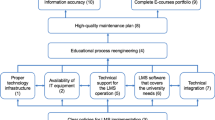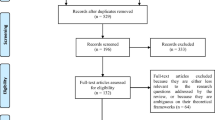Abstract
This study aims to identify the critical success factors that influence the effective use of Learning Management Systems (LMS) at technical and vocational institutions in Malaysia. From the literature review, we have identified two groups of factors which are human and technology factors. The human factor is a latent factor that will be measured by three subfactors which are motivation, self-discipline and practical training. Meanwhile, the technology factor is another latent factor that will be measured by three subfactors which are information quality, system quality and service quality. It is believed that these two latent factors can accelerate learning and teaching processes at technical and vocational institutions. A conceptual model based on the combination of De Lone and McLean Information System Success Model (IS Success) and Davis Technology Acceptance Model (TAM) is used as the theoretical model in this work. Several factors from the IS Success and TAM models together with the human and technology factors in combination will create an extensive model for much better use of LMS in technical and vocational institutions. Therefore, the purpose of this paper is to discuss the critical success factors of the model. This study employs an expert review method to verify the factors. A total of six experts are involved in the study. From this study, we can gain insight into better and effective use of the Learning Management System (LMS) in technical and vocational institutions.
Access this chapter
Tax calculation will be finalised at checkout
Purchases are for personal use only
Similar content being viewed by others
References
Abdelhak A, Mohammed T, Mohammed R, Khalid S, Abderrahim T (2015) Quality management in vocational training: evaluation of a specialized institution in ict. Procedia Soc Behav Sci 191:1928–1933. https://doi.org/10.1016/j.sbspro.2015.04.261
Al-gahtani SS (2016) Empirical investigation of e-learning acceptance and assimilation: a structural equation model. Appl Comp Inform 12(1):27–50
Almarashdesh I, Elias NF, Sahari N, Zin NAM (2013) Development of an interactive learning management system for Malaysian distance learning institutions. Middle-East J Sci Res 14(11):1471–1479
Alshammari SH, Ali MB (2016) The influences of technical support, self efficacy and instructional design on the usage and acceptance of LMS: a comprehensive review. Turkish Online J Educ Technol 15(2):116–125
Aydin S, Arpaz E, Koparan B (2015) Online learning in vocational school: focus on students’ perceptions. 174:3663–3667. https://doi.org/10.1016/j.sbspro.2015.01.1087
Azlim M, Amran M, Rusli MR (2015) Utilization of educational technology to enhance teaching practices: case study of community college in Malaysia. Procedia Soc Behav Sci 195:1793–1797. https://doi.org/10.1016/j.sbspro.2015.06.385
Bunker D (2015) Institutional repository research on information systems failures and successes : status update and future directions : status update and future directions.
Cakrawati D, Handayani S, Nuramalia M (2016) Model of learning implementation in preparing vocational teachers. https://doi.org/10.2991/ictvet-14.2015.12
Copriady J (2014) Self–motivation as a mediator for teachers??? readiness in applying ICT in teaching and learning. Turkish Online J Educ Technol 13(4):115–123
Davis FD (1989) Perceived usefulness, perceived ease of use, and user acceptance of information technology. MIS Q 13(3):319. https://doi.org/10.2307/249008
de Freita CL (2012) Modeling critical factors of quality in e-Learning : a structural equations model test. In: IEEE International Conference on Advanced Learning Technologies.
Delone WH, Mclean ER (1992) Information systems success: the quest for the dependent variable. 4.
Delone WH, McLean ER (2003) The DeLone and McLean model of information systems success: a ten-year update. J Manag Inf Syst 19(4):9–30. https://doi.org/10.1080/07421222.2003.11045748
Dlalisa S (2017) Acceptance and usage of learning management system. In: Conference on information communication technology and society (ICTAS). pp 1–7. https://doi.org/10.1109/ICTAS.2017.7920525
Dorobat (Scorta) I (2014) Models for measuring E-learning success in Universities: a literature review. Inform Econ 18(3/2014):77–90. https://doi.org/10.12948/issn14531305/18.3.2014.07
Fabito BS (2017) Exploring critical success factors of mobile learning as perceived by students of the college of computer studies–National University. In: International conference on soft computing. intelligent system and information technology
Findik Coşkunçay D, Özkan S (2013) A model for instructors’ adoption of learning management systems: empirical validation in higher education context. Turkish Online J Educ Technol 12(2):13–25
Gorbunovs A, Kapenieks A, Cakula S (2016) Self-discipline as a Key Indicator to Improve learning outcomes in e-learning environment. Procedia Soc Behav Sci 231:256–262. https://doi.org/10.1016/j.sbspro.2016.09.100
Hagos Y, Garfield M, Anteneh S (2016) Measurement factors model for e-learning systems success. In: Proceedings–international conference on research challenges in information science. https://doi.org/10.1109/RCIS.2016.7549361
Harandi SR (2015) Effects of e-learning on students’ motivation. Procedia Soc Behav Sci 181:423–430. https://doi.org/10.1016/j.sbspro.2015.04.905
Jafari SM, Salem SF, Moaddab MS, Salem SO (2015) Learning management system (LMS) success: an investigation among the university students. In: 2015 IEEE conference on E-Learning, e-Management and e-Services (IC3e). pp 64–69. https://doi.org/10.1109/IC3e.2015.7403488
Kim J, Shin S, Park J, Kim J (2018) Effectiveness of patient simulation in nursing education: meta-analysis nurse education today effectiveness of patient simulation in nursing education: meta-analysis. YNEDT 35(1):176–182. https://doi.org/10.1016/j.nedt.2014.09.009
Klašnja-Milićević A, Vesin B, Ivanović M (2018) Social tagging strategy for enhancing e-learning experience. Comp Educ 118:166–181. https://doi.org/10.1016/j.compedu.2017.12.002
Kuo FY, Tseng FC, Lin CIC, Tang WH (2013) Critical success factors for motivating and sustaining women’s ICT learning. Comput Educ 67:208–218. https://doi.org/10.1016/j.compedu.2013.03.006
Markova T, Glazkova I, Zaborova E (2017) Quality Issues of online distance learning. Procedia Soc Behav Sci 237:685–691
Mobarhan R, Majidi M, Rahman AA (2014) Motivation in electronic portfolio usage for higher education institutions. In: Information Systems and Technology for Organizational Agility, Intelligence, and Resilience, 15(November). https://doi.org/10.4018/978-1-4666-5970-4.ch011
Mohamad SNM, Salleh MAM, Salam S (2015) Factors affecting lecturers motivation in using online teaching tools. Procedia Soc Behav Sci 195:1778–1784. https://doi.org/10.1016/j.sbspro.2015.06.378
Mohammadi H (2015) Computers in human behavior investigating users’ perspectives on e-learning: an integration of TAM and IS success model. Comput Hum Behav 45:359–374. https://doi.org/10.1016/j.chb.2014.07.044
Muhammad MN, Cavus N (2017) Fuzzy DEMATEL method for identifying LMS evaluation criteria. Procedia Comp Sci 120:742–749
Ogrizek I, Lackovi S, Jurina K (2015) Successful and proactive e-learning environment fostered by teachers’ motivation in technology use. Procedia Soc Behav Sci 174:3656–3662
Olivos P, Santos A, Martín S, Ca M, Gómez-lázaro E, Maya Y (2016) The relationship between learning styles and motivation to transfer of learning in a vocational training programme. Suma Psicol 23:25–32. https://doi.org/10.1016/j.sumpsi.2016.02.001
Popovici A, Mironov C (2015) Students’ perception on using elearning technologies. Procedia Soc Behav Sci 180:1514–1519. https://doi.org/10.1016/j.sbspro.2015.02.300
Ramírez-correa PE, Rondan-cataluña FJ, Arenas-gaitán J, Alfaro-perez JL (2017) Telematics and informatics moderating effect of learning styles on a learning management system’s success. 34 272 286 https://doi.org/10.1016/j.tele.2016.04.006
Review ASL, Asalla LK, Putri MR, Pradipto YD (2017) The critical success factor of E-Learning in higher education. In : International conference on information management and technology (ICIMTech), November. pp 192–197
Rockart JF, Ball L, Bullen CV (1982) Future role of the information systems executive. MIS Q 6:1–14. https://doi.org/10.2307/248989
Sandjojo N, Wahyuningrum T (2016) Measuring e-learning systems success: implementing D and M is success model. In: Proceedings of the 2015 4th International Conference on Interactive Digital Media, ICIDM 2015, Icidm. pp 4–9. https://doi.org/10.1109/IDM.2015.7516343
Spekman JMR (1994) Characteristics of partnership success: partnership attributes, communication behavior, and conflict resolution techniques. 15(2):135–152
Wang Y, Li C, Yeh C, Cheng S, Chiou C, Tang Y, Tang T (2016) A conceptual model for assessing blog-based learning system success in the context of business education. Int J Manag Educ 14(3):379–387. https://doi.org/10.1016/j.ijme.2016.09.002
Wu JH, Tennyson RD, Hsia TL (2010) A study of student satisfaction in a blended e-learning system environment. Comput Educ 55(1):155–164. https://doi.org/10.1016/j.compedu.2009.12.012
Yasak Z, Alias M (2015) ICT integrations in TVET: is it up to expectations? Procedia Soc Behav Sci 204:88–97
Yilmaz R (2017) Exploring the role of e-learning readiness on student satisfaction and motivation in flipped classroom. Comput Hum Behav 70:251–260. https://doi.org/10.1016/j.chb.2016.12.085
Yunos JM, Sern LC, Hamdan NH (2016) Changes and challenges in sustainability of technical and vocational education and training—teacher education programme : a case study. In: IEEE 8th International Conference on Engineering Education (ICEED). pp 80–85. https://doi.org/10.1109/ICEED.2016.7856099
Yusof Y, Roddin R, Awang H (2015) What students need, and what teacher did: the impact of teacher’s teaching approaches to the development of students’ generic competences. Procedia Soc Behav Sci 204:36–44. https://doi.org/10.1016/j.sbspro.2015.08.107
Acknowledgements
This study was supported by Universiti Islam Malaysia, Cyberjaya, Selangor. My special thanks to Dr. Nur Fazidah Elias and also Dr. Noraidah Sahari for contributing to this research.
Author information
Authors and Affiliations
Corresponding author
Editor information
Editors and Affiliations
Rights and permissions
Copyright information
© 2022 Springer Nature Singapore Pte Ltd.
About this paper
Cite this paper
Ahmad, N.A., Elias, N.F., Ashaari, N.S. (2022). Critical Factors Affecting Learning Management Systems (LMS) Success in Technical and Vocational Education and Training (TVET) in Malaysia. In: Yacob, N.A., Tholibon, D.A., Mohd Yunus, N.Y., Jamil, Z., Mohd Tahir, S. (eds) Fundamental and Applied Sciences in Asia. Springer, Singapore. https://doi.org/10.1007/978-981-19-4910-4_15
Download citation
DOI: https://doi.org/10.1007/978-981-19-4910-4_15
Published:
Publisher Name: Springer, Singapore
Print ISBN: 978-981-19-4909-8
Online ISBN: 978-981-19-4910-4
eBook Packages: Social SciencesSocial Sciences (R0)




